Its hard to imagine that the bombing of the Marine Barracks occurred 25 years ago. Has that much time really gone by since then? For the families of 241 U.S. service men, 220 of them Marines, they are forever frozen in time. Forever 19, 21, 25. Forever, they will be young men full of life, never to grow old, to have families, to realize dreams. In an instant on the morning of October 23, all of that was snuffed out.
It was a typical Sunday morning, by all accounts. Most of the Marines were still asleep, formation wouldn't be until 0630. At 6:22 a.m. a vehicle born IED, as we call them now, broke through the concertina wire that surrounded the Marine compound at the Beirut airport. The 19-ton construction truck, packed with compressed gas canisters, wrapped in explosives barrelled past startled Marine sentries at their posts as they struggled to load their weapons (they weren't allowed to carry loaded weapons, this was a peace keeping mission, after all). It smashed into the lobby of the boxy, four story, concrete structure that served as the barracks for Battalion Landing Team 1/8. Its detonation was the largest non-nuclear explosion ever recorded. FBI investigators later reported that even if the truck had exploded on the access road, outside the compound, the blast would have still leveled the building.
Across town, French paratroopers stood on their balconies watching the black mushroom shaped cloud rising from the the air port. A few minutes later, another explosive laden truck would explode outside their building, leveling all nine stories and killing 58 French soldiers.
Those that survived the blast at the Marine barracks would be dubbed "The Chosen" by the chaplain.
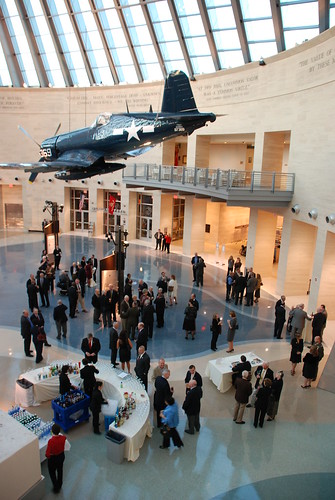
On Saturday, October 18th, some of "The Chosen" mingled with family members of the lost at the National Museum of the Marine Corps for an evening of remembrance.

They viewed the new panel display honoring the men who served in Beirut. I spoke briefly with the parents of a Marine who was killed in the blast. Their son was 19. His mother expressed her disappointment when the museum opened that there wasn't anything more than a mention of it in the time line in Legacy walk. She liked what she saw in the panel display and wanted to know how long it would be up. It will be up for at least 1 year. As you, my blog readers know, gallery space for post Vietnam will be part of Phase 2, for which they are in the midst of fund raising.
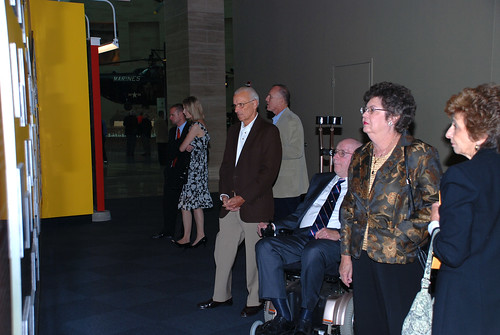
In October of 1983, President Ronald Reagan addressed the nation after the blast and shared a story that Commandant of the Marine Corps, General P.X. Kelley had shared with him. Kelly had stopped at the hospital in Wiesbaden, Germany, to award the Purple Heart to survivors. When Kelley came to a Marine that he said had more tubes going in and out of his body than he had ever seen in one body, the Marine, Lance Corporal Jeffrey Nashton, reached up and grabbed Kelly's collar to feel for the stars to make sure Kelley was who he said he was. Nashton signaled for a pad of paper and wrote "Semper Fi".
When Nashton was recovering at Bethesda Naval Hospital, Kelley paid him another visit and presented Nashton a plague with the Marine Corps emblem, Kelley's four stars and the inscription, "Semper Fi". Kelley said at the time that he felt like those stars belonged to Nashton more than to him.
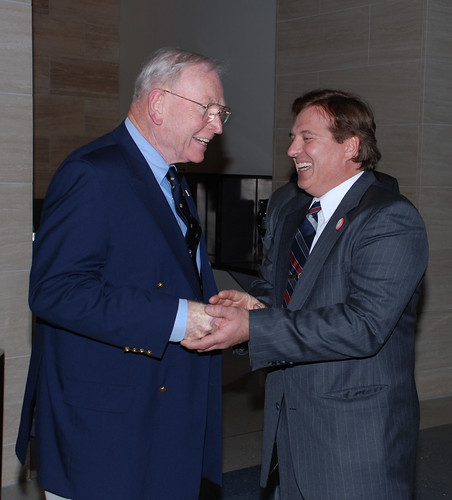
Saturday, amid flashes and video cameras, Nashton and Kelley met again.

After cocktails, everyone headed up to the mess hall for dinner. In addition to General Kelley, General George Flynn, Commanding General of Training and Education Command and retired Army General, Julius Becton, were in attendance.
I sat with three very nice gentlemen, who unfortunately got a much longer answer to one's question of "What do you do?"
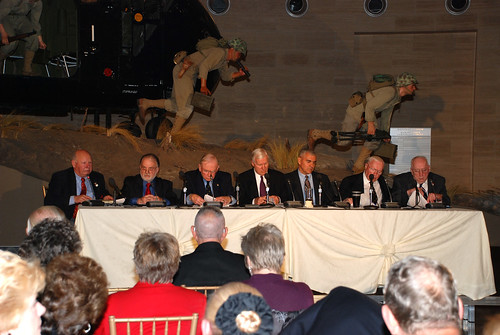
After dinner there was a panel discussion moderated by Major Bob Jordan (Ret) who had been the Public Affairs Officer in Beirut at the time of the blast. On the panel from left to right: Jordan; Claude Salhani, the United Press International (UPI) Beirut Bureau Chief at the time of the blast; General Kelley, then the Commandant of the Marine Corps; Col Tim Geraghty, commander of the Marines in Beirut; Lt. Col Paul Roy, in 1983 he was a Captain and Alpha Company's commander; General Alford Gray, First Marine Division commander; Lt. Col Larry Gerlach, who had been the Battalion Commander.

One by one, they told of their reaction to the event and what they thought had led up to the attack. It was emotional for some on the panel. Lt. Col Gerlach was asked to speak to the preparation of the BLT prior to deployment and how they maintained their readiness. He held up a copy of the pamphlet his intel officer had put together to educate the Marines in the BLT on who and what they would encounter in Beirut, his intel officer died in the explosion. Gerlach himself, had been blown out the window of his second floor office and was partially paralyzed. He emphasized that the Marines were well trained and that they performed perfectly before and after the bombing.

LtCol Roy recounted how he had just graduated from Amphibious Warfare School (AWS) and was excited to be taking command of a company. He shared, pausing to reign in the emotions, that the realization of his responsibility was driven home when the parents of one of his Marines said to him prior to deployment, "Good luck, bring our boy home." As a parent of three children, he realized what those parents were placing in his care.
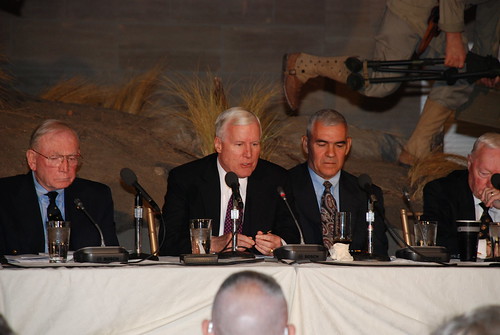
Col Geraghty spoke of the difficult position the Marines were placed in. They couldn't take on a defensive or offensive posture. He had expressed his opinion that providing fire support for the Lebanese Army would end the US position of neutrality. He wanted everyone to recognize the professionalism of the Marines of the 24th MAU, they were committed and dedicated to their duty and they carried out their mission which required extraordinary discipline.
In addition to the Marines, the network of wives was extraordinary. He said he was inspired by the families who picked up their shattered lives and raised their families.
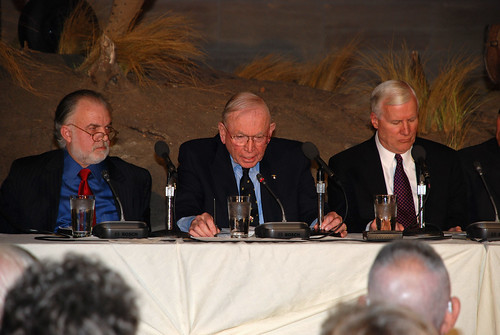
General Kelley noted at the close that we were still in a battle against the extremists. We've been engaged, militarily, with them since 1983.
"There is a blood debt still out there, it will be paid back some day," said Col Geraghty.






2 comments:
Just passing through...Nice photos.
Great post, thank you!
Post a Comment